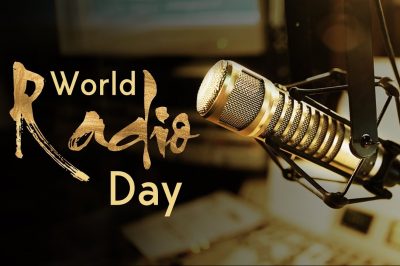World Radio Day prompts reflection on radio’s profound impact, bridging communities, fostering cultural exchanges, and enabling mass communication. In celebrating, we recognize the radio’s enduring influence.
At its core, radio unifies, transcending geographical and cultural barriers in an era dominated by visual media. It fosters a global community through airwaves, connecting individuals who might never interact otherwise.
Radio’s facilitation of cultural exchanges is noteworthy, serving as a conduit for sharing diverse traditions, music, and stories. Amplifying marginalized voices contributes to a more prosperous global culture, promoting an understanding of human diversity.
The Emergence and Consolidation of Radio
Radio uses the transmission and reception of radio frequency electromagnetic waves to carry sound messages.
The invention of radio was a combined effort of several scientists and inventors beginning in the 18th century. There are several whose contributions to the field of science regarding radio waves were significant.
James Clerk Maxwell was a Scottish scientist who predicted the existence of radio waves during the 1860s. Henrich Rudolf Hertz was a German scientist, and in 1866, he discovered that vibrations of electric currents could be projected into space in the form of radio waves.
The discovery of electromagnetic waves, including radio waves, by Heinrich Rudolf Hertz in the 1880s came after theoretical development on the connection between electricity and magnetism that started in the early 1800s. This work culminated in a theory of electromagnetic radiation developed by James Clerk Maxwell in 1873, which Hertz demonstrated experimentally. Hertz considered electromagnetic waves to be of little practical value.
Other experimenters, such as Oliver Lodge and Jagadish Chandra Bose, explored the physical properties of electromagnetic waves, and they developed electric devices and methods to improve the transmission and detection of electromagnetic waves. However, they needed to see the value in creating a communication system based on electromagnetic waves.
Also Read: Current highlights of Power Dynamic between China and United States
In the mid-1890s, based on techniques physicists used to study electromagnetic waves, Guglielmo Marconi developed the first apparatus for long-distance radio communication. On 23 December 1900, the Canadian inventor Reginald A.
Fessenden became the first person to send audio (wireless telephony) using electromagnetic waves, successfully transmitting over a distance of about a mile (1.6 kilometers,) and six years later, on Christmas Eve 1906, he became the first person to make a public wireless broadcast. By 1910, these various wireless systems had come to be called “radio.”
The first use of radio technology appeared aboard seagoing ships, helping them communicate with nearby vessels and the shore. Before this, ships relied on semaphore flags to send messages between streamer ships and carrier pigeons for longer-range communication.
While initially only able to transmit beeps in Morse code, the radio is directly responsible for the distress signal and rescue response in the Titanic disaster. Without radio, no one would have survived.
The radio also found in aviation when Frederick Baldwin and John McCurdy used it on their biplane in 1910. In 1921, the radio became part of public safety vehicles in Detroit, due to Police Commissioner William Rutledge.
Role of Radio in Mass Communication
Its role in mass communication cannot be overstated. A constant companion through historical events, radio provides real-time information, contributing to the collective consciousness of societies worldwide.
Radio maintains relevance in today’s digitally saturated landscape by offering an intimate and personal connection. Unlike visual media demanding undivided attention, a human voice resonating through airwaves evokes emotions. Radio becomes a companion during daily activities.
The persuasive influence of radio on public opinion is significant. One broadcast at a time shapes perceptions, sways opinions, and influences societal attitudes, wielding considerable power in molding collective mindsets.
However, with great power comes responsibility. Radio broadcasters must provide accurate, unbiased, and diverse content, especially in an age where misinformation spreads rapidly. Radio fosters critical thinking and informed citizenship.
As we celebrate World Radio Day, recognizing the importance of supporting this vital medium is crucial. We each contribute to preserving radio’s unique role through listening, advocating for its continued relevance, or engaging with local stations.
Ongoing support ensures it remains a symbol of connectivity, fostering cultural understanding and providing a powerful platform for mass communication.
In conclusion, World Radio Day reminds us of radio’s enduring impact, transcending time and technology. Let’s collectively appreciate and support this vital medium, a steadfast companion in our journey through history.







